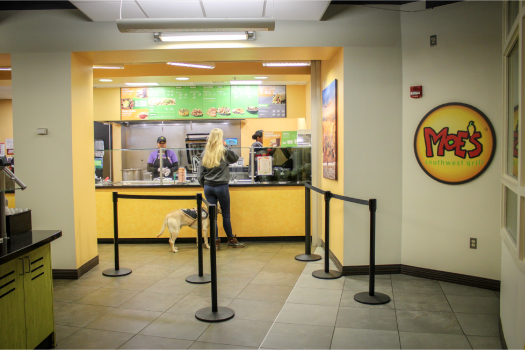In recent weeks, the COVID-19 pandemic has forced people inside their homes and left college students everywhere unable to return to campus to finish out the school year. As people adjust to this new, upturned version of “normal” life, many still reside on the university’s campus, including approximately 400 students and many essential workers.
Most of these students do not have the ability to return to their homes, so they stay on campus out of necessity. In response to this relatively small student population still living on campus, Deacon Dining has made considerable efforts to provide meals, groceries and delivery services, so these students may have something to eat while in quarantine.
While many of the usual dining services are closed, like the restaurants in the Benson University Center food court and Zick’s, the Pit and Subway stay open. However, in recent weeks, Deacon Dining has developed new methods to feed people, such as prepared meal-kits and food delivery. Additionally, Deacon Dining has operated a temporary grocery store since March 30.
Due to COVID-19, leaving the house poses a risk and many grocery stores face shortages, according to the hospitality services director at Deacon Dining, Mark Block.
“When you go to Lowes or Harris Teeter, it is slim pickings,” Block said. “We wanted to make sure our students on-campus still have everything they need without the risk of going to the grocery story.”
The Deacon Dining grocery store serves as both an alternative for students who would prefer to stay on campus and a necessity for those unable to leave campus.
To order groceries, students can simply go to the Deacon Dining website and complete a google form for their shopping list. Food options include various vegetables, fruits, dairy products, meats, canned goods, bread, frozen food, snacks and even some personal care and household needs products.
Averaging 10 orders a day, the management team at Deacon Dining has set up a system for grocery delivery that utilizes social distancing guidelines.
“We put aside areas by various residence halls with tables marked and sanitized for delivery,” Block said. “When we complete the order, we notify students that we are on route, we put the groceries down on the table and tell them that it has arrived. With some of these items being perishable, we want to make sure we are in constant contact with the students.”
They have also set up some drop-off points for students who do not live directly on campus. Deliveries are made primarily to on-campus students and students living at Deacon Place, though some deliveries have been made to students living on Polo Road.
While meal delivery remains a viable option, the director of hospitality services at Deacon Dining, Robin Day, explained that many students still like to go to the Pit.
“We’ve seen students are happy not to be stuck in dorms all day and to get out of their rooms and socialize,” Day said.
The Pit continues to offer breakfast, lunch and dinner with services like the omelette station, salad bar, deli, pasta station and more still readily available.
Though Block explained that providing adequate food services initially posed a challenge, Deacon Dining has since been able to meet the needs of all the students who remain on campus.
“Because it happened so quickly, it was a challenge to find a system that works for students at such a quick pace,” Block said.
Even so, the temporary grocery store has been largely successful, with both Block and Day noting the outpouring of support they have received so far from students benefiting from the services.
According to Day, on the “Notes” section of delivery, students have left countless messages of appreciation for the Deacon Dining staff, including “stay safe” and “thinking about you and the other team members.” She says that the whole process has been an enjoyable, positive experience amidst the difficult situation of the pandemic.
“The students have been so gracious,” Day said.
The notes and the delivery service foster human connection and positivity despite the physical distance in the ghost-town of a usually populated campus. Even in these strange times, the community has still found a way to provide for students and appreciate those who are helping everyone persevere during difficult times. The work put in by the Deacon Dining workers is just one example of the care the university is prioritizing for the students who remain on-campus.
















